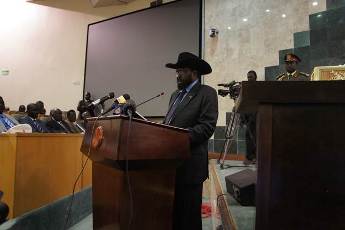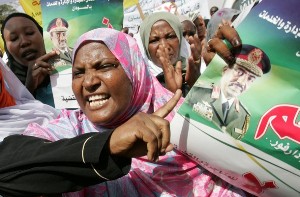Kiir explains decision to halt oil production as Sudan plays it down
By Ngor Arol Garang
January 23, 2012 (JUBA) – South Sudan’s president, Salva Kiir has asked the country’s legislature to back his government’s decision to halt oil production in the wake of what he described as “looting” by neighbouring Sudan of oil revenues worth $815 million.

Khartoum defended its decision to confiscate southern oil, saying Juba has failed to pay any fees for using Sudan’s facilities since South Sudan seceded in July last year, as per the 2005 peace deal that ended more than two decades of civil wars between the two sides.
Addressing members of the Juba based National Legislative Assembly, President Kiir explained that his government took the decision to halt oil production after exhausting all possibilities of a peaceful settlement, and after there was no guarantee that oil flowing through Sudan would “reach its intended destination”.
He went on to recount that Khartoum informed them on December 6 that all oil shipments belonging to South Sudan would only be allowed to leave Port Sudan after paying the “exorbitant” amount of $32.2 per barrel.
South Sudan strongly objects to Khartoum’s demands of $32.2 per barrel, saying it is “a broad daylight robbery,” according to one official, and insisting it will only pay fees in accordance with international standards.
Kiir revealed that last week he sent envoys to Kenya, Uganda and Ethiopia whose presidents reached out to Sudan’s president, Omar Hassan al-Bashir and asked him to stop taking “unilateral decisions” about South Sudan’s oil.
“The response from Bashir is that he will not stop taking oil until we pay the exorbitant amount of $32.2 per barrel, something that is completely out of international norms and a precedence that we are unwilling to set,” Kiir declared.
According to Kiir, the total amount of oil revenues “looted” by Khartoum since December through blocking oil shipments and diversions amounts to approximately $815 million.
“We cannot allow assets which clearly belong to the Republic of South Sudan to be subject to further diversion,” he told parliamentarians in explaining his cabinet’s decision to halt production with immediate effect.
However, Kiir acknowledged that his country needs to find “other sources of funding” in order to cope with the disruption of oil revenues on which South Sudan’s growing economy heavily relies.
The president revealed that he had already instructed the ministry of finance to devise “contingency plans” to accelerate the collection of non-oil revenues.
He further emitted assurances that the government can survive “for the immediate future” on the existing cash reserves.
“I want to assure the people of South Sudan that all measures will be taken to ensure that any disruption is minimal” he said.
Kiir also warned that the disruption of oil revenues “could last many months” in light of what he termed as the Sudanese government’s failure to negotiate “in good faith”.
He however did not shut the door on continued negotiations with Sudan, saying his government would do everything possible to resolve the impasses and restore the flow of oil.
“I call upon this august house to support the decision of the Council of Ministers to stop the flow of oil and search for alternative sources of funding to manage government projects,” Kiir told the MPs.

Meanwhile in Khartoum, the Sudanese government has downplayed the impact of South Sudan’s decision to suspend oil production, and suggested that the demonstrations in Juba were contrived.
The media secretary of Sudan’s ruling National Congress Party (NCP), Ibrahim Gandor, said that the biggest loser from the disruption of oil production is South Sudan itself, not Khartoum.
He further said that Juba demonstrations were “concocted” by the government of South Sudan to send a message saying that the South Sudanese public supports the decision.
Gandor said that the government in Juba believes that the decision is a way of exerting economic pressure on Khartoum coupled with Juba’s support for armed groups in order to change the government in Sudan.
“This is a big delusion,” he added.
However, the state minister for media in Sudan, Sana Ahmad, struck a conciliatory tone, saying her country is still keen to reach a negotiated settlement under the mediation of the African Union High Implementation Panel (AUHIP).
She added that Sudan had taken all precautions to avert the negative impact of South Sudan’s decision to stop oil production.
(ST)
